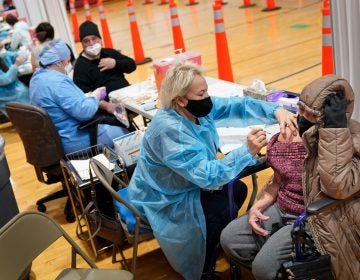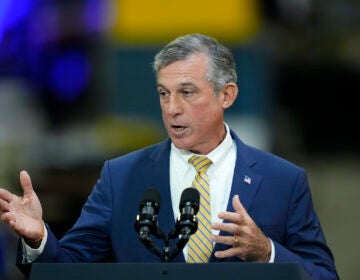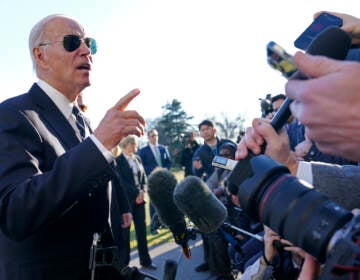County sues Wolf, seeking $13M in coronavirus funding he withheld
Wolf withheld nearly $12.8 million in funding from Lebanon County, where local Republican leaders voted in mid-May to lift pandemic restrictions in defiance of the governor.
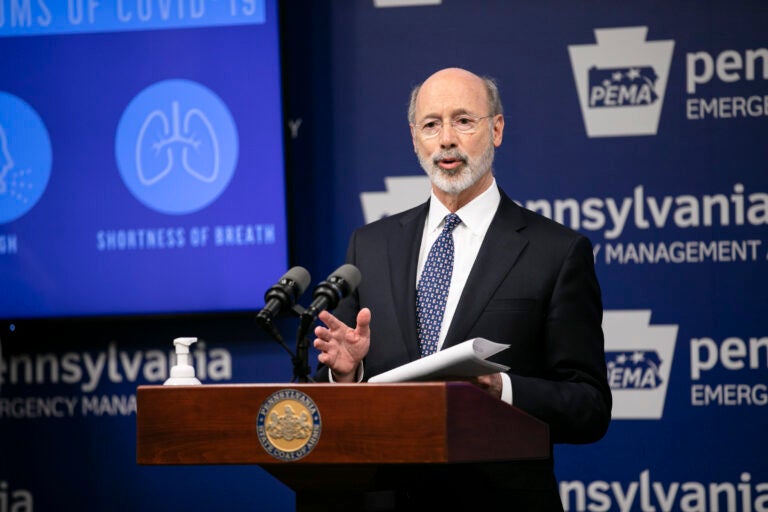
Pennsylvania Gov. Tom Wolf addresses reporters at a press conference in Harrisburg. (Office of Gov. Tom Wolf)
A Pennsylvania county sued Wednesday to compel Gov. Tom Wolf to release $12.8 million in federal coronavirus relief funding that he withheld after county leaders defied his shutdown orders and sought to reopen on their own.
Wolf yanked the funding from Lebanon County, where local Republican leaders voted in mid-May to lift pandemic restrictions in a direct challenge to the Democratic governor’s authority. Wolf’s decision to retaliate left Lebanon as the only eligible Pennsylvania county to have been cut off from a $625 million pot of federal coronavirus relief money distributed by the state.
The county’s lawsuit, filed in Commonwealth Court, cast the Board of Commissioners’ vote to unilaterally move Lebanon to the less restrictive “yellow” phase of Wolf’s reopening plan as merely symbolic. The lawsuit said Wolf had no legal right to withhold funding appropriated by the Legislature, accusing him of a “gross abuse of power” and acting like a “de facto King.”
Wolf’s office had no comment on the lawsuit.
Wolf has repeatedly addressed his decision to withhold the funding, saying Lebanon County had to pay a price for its recalcitrance.
“Don’t come and say you want something from the state when you haven’t followed the rules. There are consequences. These are the consequences,” he said at a news conference last week.
He stuck to his guns at a Tuesday appearance in York, predicting a court fight and saying of Lebanon: “They apparently didn’t feel they needed the money at that point.”
The Lebanon commissioners passed their resolution by a vote of 2-1 on May 15, four days after Wolf threatened to block COVID-19 funding to any county that defied him. At the time, several GOP-controlled counties were threatening to lift Wolf’s pandemic restrictions on their own, asserting that his shutdown of “non-life-sustaining” businesses was inflicting undue economic hardship.
State lawmakers appropriated the federal relief money in late May, after Lebanon County’s vote to move to yellow. The law, signed by Wolf on May 29, contained no provision that linked funding to a county’s adherence to Wolf’s pandemic restrictions.
Wolf “did not exercise his veto power to attempt to amend or modify or change that before it became law,” the county’s lawyer, David Warner Jr., said in a phone interview.
“While he may have made those comments or statements that there may be future consequences, he ultimately signs a law that allocates the dollars to us anyway,” Warner said.
It was only later that Wolf’s Department of Community and Economic Development published guidelines that “any noncompliant county will be ineligible for funding,” said the lawsuit. Wolf should not be able to “capriciously circumvent the entire legislative process, on a whim,” the lawsuit said.
The local chamber of commerce has said Wolf’s decision unfairly punishes small businesses, nonprofits and others. Lebanon County’s sole Democratic commissioner, Jo Ellen Litz, who voted against the county’s unilateral move to yellow, has been lobbying Wolf to release the money.
“Lebanon is not a wealthy county, and I’d rather not see every man, woman, and child in our community of over 140,000 punished for a vote by two people who later tried to make amends. We need to work together to save lives and livelihoods,” she said via email last week.
WHYY is your source for fact-based, in-depth journalism and information. As a nonprofit organization, we rely on financial support from readers like you. Please give today.


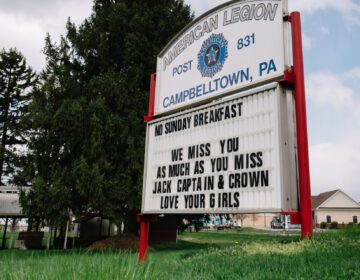

![CoronavirusPandemic_1024x512[1]](https://whyy.org/wp-content/uploads/2020/03/CoronavirusPandemic_1024x5121-300x150.jpg)
